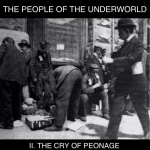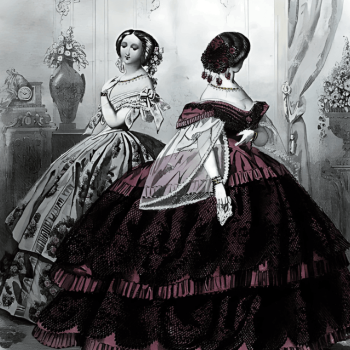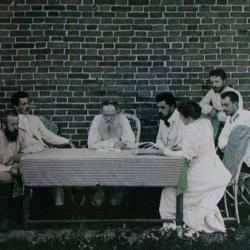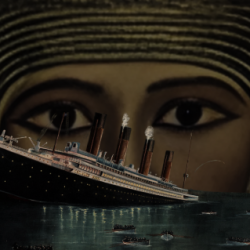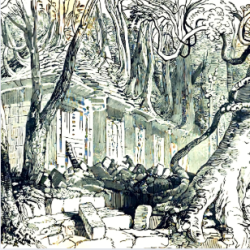WITCH TALES
I.
⸻
It was late June 1888. Charley sat alone with Blavatsky at a small table in the drawing-room at Lansdowne Road.
⸻
“Yes, Sir! Witch-stories, and in this enlightened age!” said Blavatsky. “What do you call it but a witch-story, that very experiment you told me of, made by my friend the Spookical Researcher? Is it not witchcraft, to transfer pinches and burns, pain and suffering, in fact, though only slight in this case, to another person at a distance? Suppose it was not as an experiment, but in dead earnest, and with dire malice and evil intent? What then? Would the victim not feel it? Could he protect himself? And would not that be witchcraft in just the sense that sent people to the stake and flames all through the Middle Ages? Have you read the famous witchcraft trial at Salem? Yes, Sir! witchcraft in this very enlightened age—the darkest, most material, and unspiritual that the world has ever seen.”
“Oh,” said Charley, “but sending pinches by thought-transference can do no great harm?”
“You think not? Well, you don’t know what you are talking about. That is the privilege of the young! Once the door is open for that sort of thing, where do you think it is going to be shut? It is the old tale; give the devil an inch, and he will take a mile—give him your finger, and he will presently take your whole arm. Yes, and your body, too! Do you not see the tremendous evils that lie concealed in hypnotism?
Look at Jean-Martin Charcot’s experiments at the Pitié-Salpêtrière Hospital! [1] He has shown that a quite innocent person can be made to perform actions quite against his or her will—they can be made to commit crimes, even, by what he calls ‘Suggestion.’ The somnambule [sleepwalker] will forget all about it, while the victim can never identify the real criminal. Charcot is a benevolent man and will never use his power to do harm. But all men are not benevolent. The world is full of cruel, greedy, and lustful people, who will be eager to seize a new weapon for their ends, and who will defy detection and pass through the midst of us all unpunished.”
“But witch-tales?”
“Yes, Sir! witch-tales in this enlightened age! And mark my words! You will have such witch-tales as the Middle Ages never dreamt of. Whole nations will drift insensibly into black magic, with good intentions, no doubt, but paving the road to hell nonetheless for that! Hypnotism and suggestion are great and dangerous powers, for the very reason that the victim never knows when he is being subjected to them; his will is stolen from him and mark my words: these things may be begun with good motives, and for right purposes. But I am an old woman and have seen much of human life in many countries. And I wish with all my heart I could believe that these powers would be used only for good! Whoever lets himself or herself be hypnotized, by anyone, good or bad, is opening a door which he will be powerless to shut; and he cannot tell who will be the next to enter! If you could foresee what I foresee, you would begin heart and soul to spread the teaching of universal brotherhood. It is the only safeguard!”
“How is it going to guard people against hypnotism?”
“By purifying the hearts of people who would misuse it. And universal brotherhood rests upon the common soul. It is because there is one soul common to all men, that brotherhood, or even common understanding is possible. Bring men to rest on that, and they will be safe. There is a divine power in every man which is to rule his life, and which no one can influence for evil, not even the greatest magician. Let men bring their lives under its guidance, and they have nothing to fear from man or devil.”
Blavatsky lifted her right hand six inches over the table and dipped her slender fingers into a puddle of air. To Charley’s astonishment, the “pantomime” produced a clear tapping sound on the surface of the table, though no discernable physical contact was made.
“How is your family, dear? How is Lewis and Johnston of Beelykeelbeeg?”
“My brother will be sitting for the Civil Service Examination the same time as me in a few weeks,” Charley said distractedly.[2] The tapping had not ceased. “As for my father, ‘Johnston of Ballykilbeg,’ well, he just spoke at the Anti-Compensation Demonstration in Hyde Park.”[3] Unable to ignore the tapping any longer, Charley laid his closed hand before Blavatsky on the table. “That is interesting! Suppose you make the raps come on the back of my hand!”
The crackling raps continued as before. Charley soon felt the sensation of an electric “spurt” emitting from his hand toward her fingertips.
“It would be still more interesting if you made the raps come on the top of my head!”
Blavatsky smiled and, raising her hand a foot above Charley’s head, produced six raps.
Charley gazed at Blavatsky in curious confusion and waited, impatiently, for his mind to finish percolating so he might pour a cup of his thoughts.
“I could only show you how it is done if you were clairvoyant! And now, my dear, it is getting late,” she said, dismissing Charley with her characteristic grand air. “I am getting sleepy. So, I must bid you goodnight!”[4]
→
THE AGONISED WOMB OF CONSCIOUSNESS SECTIONS:
INTRO: CHARLEY.
I. WITCH TALES.
II. CARELESS WHENCE COMES YOUR GOLD.
III. THE TIMES ARE CHANGED.
IV. DENIZEN OF ETERNITY.
V. DOMOVOY.
VI. WITH LOW AND NEVER LIFTED HEAD.
VII. IMPERIAL GOTHIC.
VIII. THE SERVANT OF THE QUEEN.
IX. THE DWELLER ON THE THRESHOLD.
X. INDO-GOTHIC YOGA.
XI. INTENDED FROM ABOVE.
XII. THE SÉANCE ON CHEYNE ROW.
XIII. EVEN IN NEW ROOMS.
XIV. RUSSIA’S LEGENDARY LORE.
[APPENDICES]
SOURCES:
[1] Jean-Martin Charcot was France’s pre-eminent neurologist. During his tenure as director of France’s Salpêtrière Asylum he conducted groundbreaking hypnotic experiments. He presented a series of influential lectures at the Salpêtrière Asylum between 1883-1884. [Taylor, Eugene. “William James and Depth Psychology.” Essay in The Varieties of Religious Experience: Centenary Essays. Ferrari, Michel (ed.) Imprint Academic. Exeter, England. (2002): 11-36.]
[2] “High School Dublin.” The Dublin Daily Express. (Dublin Ireland) April 30, 1889; “The Late L. A. M. Johnston.” The Singapore Free Press and Mercantile Advisor. (Singapore, Straits Settlements) October 2, 1908.
[3] “Anti-Compensation Demonstration in Hyde Park.” The Widnes Examiner. (Lancashire, England) June 9, 1888.
[4] Johnston, Charles. “Helena Petrovna Blavatsky: Part IV.” The Theosophical Forum. Vol. VI. No. 3. (July 1900): 44-46.


